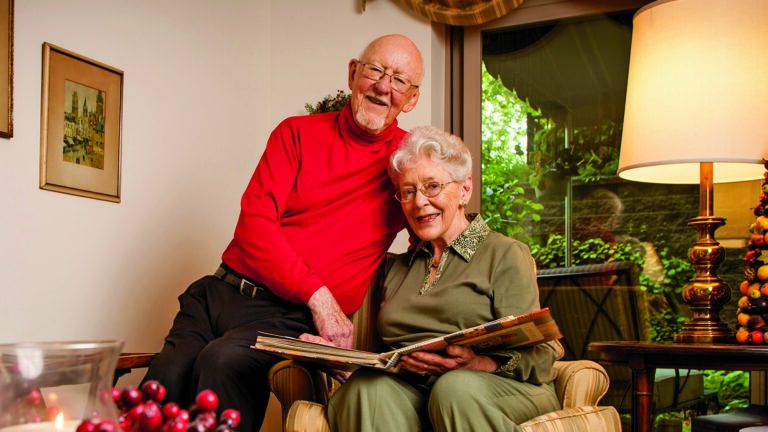JT Jester, from Grosse Point, Michigan, was born with VATER/VACTERL syndrome, a serious, life-threatening disorder that affects many of the body’s systems. He also suffered from extreme dyslexia and short-term memory loss. Even when he was told he would never learn to read or write, Jester refused to be limited by these challenges. A graduate of High Point University, Jester is now an inspirational speaker, podcaster, philanthropist, as well as an experienced mountaineer, extreme skier, and adventurer. He established the JT Mestdagh Foundation to bring encouragement, joy, and laughter to people with physical and learning disabilities and their families.
His new book, No Bad Days: How to Find Joy in Any Circumstance, tells his inspirational true story and encourages people to move past their limitations and live full, passionate lives. He talked with Guideposts.org about his story, his new book, and what it truly means to have no bad days.
GP: In your life you have dealt with many challenges. What were they? How does your story begin?
My journey started at birth. My parents thought they had a healthy pregnancy. But when I was born, I went right to the NICU. I spent the first 10 days of my life there. I was born with something called VACTERL syndrome, which is a birth defect that can affect many parts of your body. For me, it affected my gastrointestinal system and my spinal cord.
My medical journey began with multiple surgeries to correct my gastrointestinal system. As I continued to grow, other parts of VACTERL syndrome, which we were warned about, started to pop up. I had more surgeries in middle school and high school to repair my spinal cord. I was dealing with different symptoms, like a limp, loss of bladder control and things along those lines.
So the medical journey was obviously a priority in my family’s life, but then I had an education piece that was a challenge too. I was born with severe dyslexia and short-term memory loss. I had difficulty learning to read and write, but that’s all I wanted to do.
GP: In your book, you talk about how your parents relied on their faith during this time. Can you tell me about that?
They were not expecting to have this hiccup in the road. Their faith played a big role in their life but it became even stronger. I think when we’re going through hard times, sometimes we become stronger in our faith. That’s when we rely on the good Lord more.
My dad told me a story about the day I was born. That evening, when he went home, he was worried about the [difficult] times to come. He picked up his Bible and it fell open to a very important passage. It was Mark 10: 13-16, which is about how God takes care of all his children. It was the first thing he saw, and it was a powerful message.
They also relied on each other during that time. There were other people in their life of course, like family and friends. But when you don’t experience [having a sick child] yourself, sometimes you don’t know how to react to it. So, they stayed strong in their faith together.
GP: How did your experience of growing and living with physical and learning challenges affect your own faith?
One important thing I learned on my journey was finding my tribe. To be able to do that, I needed to put the right people into my life. Early on, it was my doctors, my educators, my parents and family. Nowadays, I’ve been blessed to be a part of a church that has been very influential in my faith journey. I’ve had amazing people along the way that have given me that ability to continue to grow. I build my tribes from the top down and created a stronger relationship with God.
My trials taught me a lot too. We are all going to fall and we’re all going to have those challenges in life. It’s those experiences that build our relationship with the Lord.
GP: What role has the power of prayer played in your life?
I’ve been blessed to have so many people in my life praying for me, so prayer is one of the biggest things in my life. I think that prayers are truly answered.
Prayer has also been important for myself, to build and grow my relationship with God. I think that is why I love the outdoors so much. Prayer goes everywhere with us, but for me it’s [strongest] in nature. Whenever I’m in nature, I call it God’s country. I’m able to connect with Him in the beauty of what He has created. I can escape from the challenges I face, or those naysayers in life that didn’t believe I could do different things.
READ MORE: 10 Bible Prayers for Comfort and Hope
GP: One of your many accomplishments was climbing to the peak of Mt. Kilimanjaro. What did you learn from that experience?
It came with its challenges, but when I made it to the top, it was such an amazing spiritual moment. Reaching that [summit] was a great joy and a huge success. Because of my medical [history], this was something no one thought I’d be able to do. It was something I never thought I’d be able to do.
It made me realize that if you put your mind to it, you can accomplish anything. In my book, I talk about how we all have our mountain to climb in life, and how getting up to the summit and then continuing is so important.

GP: Speaking of your book, I’m very struck by the title, “No Bad Days.” Where does that title come from and what does it mean to you?
The phrase “no bad days” came from when I was seven- years-old, in the hospital having one of my spinal cord surgeries. My dad came into the room and said, “JT, I’m so sorry for what you’re going through.” He told me that I looked at him and said, “Dad, it’s okay. There are no bad days. There are only hard days. And we get through those.” I know that was the good Lord speaking through me. It became a life slogan for my whole family.
When people see the book, they ask me, “How do you not have any bad days?” For me, every day is a blessing. We can wake up, breathe the air around us, see the people in our lives and see the way God’s working throughout our world. We are going to have our discomforts, our pains, our challenges in life. There are going to be hard days, but we get through those with the people in our life.
GP: What do you hope people will get out of your book?
The book talks about my life journey, but it also brings in other people’s journeys. Whether that’s the loss of a loved one, living with learning challenges like dyslexia, or medical challenges. The book encapsulates all these different people’s stories and their tactics of how they have overcome hardship.
The book also talks about storytelling and how important it is. We all have challenges in life and being able to express them to others is so crucial. It allows you to be open to people that you trust, and then in return, they trust you and express what’s going on in their life. You can support them and help them, and they will be there to support and help you.
And it’s not just having someone there for you in challenging times, but someone there to motivate you and push you and to make you grow even more. My book is about how we all have to share our stories and continue in helping each other. We all have a story that God is writing for us.
GP: What advice would you have for people who are looking to find more joy in their lives?
Find your passions in life. For me, being in nature is where I find a lot of joy. And find the people to do those passions with. Having good, strong, faithful relationships are so important to finding joy.
My second tip is to just get outside and get moving. Be active in some way. Some days that can be very hard to do, but it will help get your mind motivated.
READ MORE: A 10-Word Prayer When You’re Out of Options
GP: What about those days when someone just is not able to do this? What advice would you give to people who are having very hard days?
In the hardest of days, having your tribe is important. That’s something that you can rely on and lean on. When I have a hard day, I will sometimes call one of my very close friends who has been a great teacher to me.
This is also why your relationship with God is so important. Knowing that you’re not alone because He’s there to support and love you. We are all going to have those very hard days, so being able to rely on our relationship with the Lord is the most important.
This interview has been lightly edited for clarity and length.





